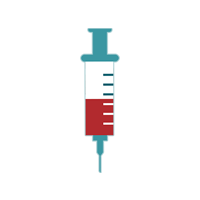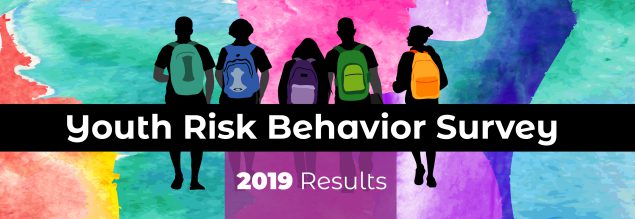Health & Academics
The academic success of America’s youth is strongly linked with their health, and is one way to predict adult health outcomes.
Healthy students are better learners

Health-risk behaviors such as early sexual initiation, violence, and substance use are consistently linked to poor grades and test scores and lower educational attainment.1-5
In turn, academic success is an excellent indicator for the overall well-being of youth and a primary predictor and determinant of adult health outcomes.6-8 Leading national education organizations recognize the close relationship between health and education, as well as the need to foster health and well-being within the educational environment for all students.9-12
Schools are the Right Place for a Healthy Start
Schools play a critical role in promoting the health and safety of young people and helping them establish lifelong healthy behaviors. Research shows that school health programs reduce the prevalence of health risk behaviors among youth and have a positive effect on academic performance.13 CDC analyzes research findings to develop strategies for schools to address health risk behaviors among students and creates tools to help schools implement these strategies.
Health & Academics: What the Research Says
Compared to students who received mostly As, those who reported receiving mostly Ds and Fs were:




Source: CDC. Health-Related Behaviors and Academic Achievement Among High School Students — United States, 2015. MMWR 2017;66:921–927.

Data from the 2019 National Youth Risk Behavior Survey (YRBS) illustrate the prevalence of health behaviors among youth can have a significant impact on learning.
Resources
Fact Sheets
- Sexual Behaviors and Academic Achievement pdf icon[PDF – 2 pages]
- Health Risk Behaviors and Academic Achievement pdf icon[PDF – 2 pages]
- Alcohol Use and Academic Achievement pdf icon[PDF – 2 pages]
- Drug Use and Academic Achievement pdf icon[PDF – 2 pages]
- Unintentional Injuries and Academic Achievement pdf icon[PDF – 2 pages]
- Violence and Academic Achievement pdf icon[PDF – 2 pages]
- Suicide and Academic Achievement pdf icon[PDF – 2 pages]
Data Tables
- Alcohol and Academics pdf icon[PDF – 1 page]
- Dietary Behavior pdf icon[PDF – 2 pages]
- Drug Use and Academics pdf icon[PDF – 1 page]
- Obesity and Academics pdf icon[PDF – 1 page]
- Other Topics and Academics pdf icon[PDF – 1 page]
- Physical Activity Sedentary Variables pdf icon[PDF – 1 page]
- Sexual Behaviors and Academics pdf icon[PDF – 1 page]
- Suicide and Academics pdf icon[PDF – 1 page]
- Tobacco and Academics pdf icon[PDF – 1 page]
- Unintentional Injuries and Academics pdf icon[PDF – 1 page]
- Violence and Academics pdf icon[PDF – 1 page]
Other Publications and Products
- MMWR: Health-Related Behaviors and Academic Achievement Among High School Students — United States, 2015
- Healthy Schools: Health and Academics Factsheets
- Resources for Reporting on Suicide, Bullying, and Sexual Violence pdf icon[PDF – 1 page]
- Bullying and Absenteeism: Information for State and Local Education Agencies pdf icon[PDF – 1 page]
- CDC Grand Rounds: Adolescence — Preparing for Lifelong Health and Wellness
- Whole School, Whole Community, Whole Child Model factsheet pdf icon[PDF – 1 page]
Videos
CDC experts Dr. Catherine Rasberry and Dr. Georgianne Tiu speak about the connection between teen health and academic achievement.
- Carlson SA, Fulton JE, Lee SM, Maynard M, Drown DR, Kohl III HW, Dietz WH. Physical education and academic achievement in elementary school: data from the Early Childhood Longitudinal Study. American Journal of Public Health 2008;98(4):721–727.
- Spriggs AL, Halpern CT. Timing of sexual debut and initiation of postsecondary education by early adulthood. Perspectives on Sexual and Reproductive Health 2008;40(3):152–161.
- Srabstein J, Piazza T. Public health, safety and educational risks associated with bullying behaviors in American adolescents. International Journal of Adolescent Medicine and Health 2008;20(2):223–233.
- Rasberry CN, Tiu GF, Kann L, McManus T, Michael SL, Merlo CL, Lee SM, Bohm MK, Annor F, Ethier K. Health-related behaviors and academic achievement among high school students—United States, 2015. MMWR Morb Mortal Wkly Rep 2917;66:922-927.
- Bradley BJ, Greene AC. Do health and education agencies in the United States share responsibility for academic achievement and health? A review of 25 years of evidence about the relationship of adolescents’ academic achievement and health behaviorsexternal icon. J Adoles Health 2013;52:523-532.
- Harper S, Lynch J. Trends in socioeconomic inequalities in adult health behaviors among U.S. states, 1990–2004. Public Health Reports 2007;122(2):177–189.
- Vernez G, Krop RA, Rydell CP. The public benefits of education. In: Closing the Education Gap: Benefits and Costspdf iconexternal icon. Santa Monica, CA: RAND Corporation; 1999:13–32.
- National Center for Health Statistics. Health, United States, 2010: With Special Feature on Death and Dying. Hyattsville, MD: U.S. Department of Health and Human Services; 2011.
- Council of Chief State School Officers. Policy Statement on School Health; 2004.
- National School Boards Association. Beliefs and Policies of the National School Boards Associationpdf iconexternal icon. Alexandria, VA: National School Boards Association; 2017.
- American Association of School Administrators. AASA position statementspdf iconexternal icon. Position statement 3: Getting children ready for success in school, July 2006; Position statement 18: Providing a safe and nurturing environment for students, July 2007.
- ASCD. Making the Case for Educating the Whole Childpdf iconexternal icon. Alexandria, VA: ASCD; 2011.
- Murray NG, Low BJ, Hollis C, Cross AW, Davis SM. Coordinated school health programs and academic achievement: A systematic review of the literatureexternal icon. J Sch Health 2007;77:589-600.